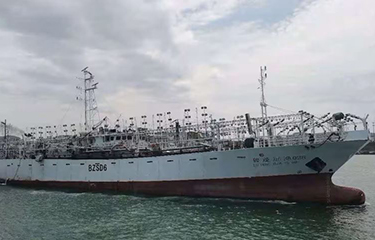A Chinese fishing vessel sunk in the Indian Ocean on 16 May with 39 crew onboard.
The Lu Peng Yuan Yu No 28, owned by Shandong-based Chinese state-owned fishing company Penglai Jinglu Fishery Co, activated its emergency beacon at 5:30 a.m. local time on Tuesday, 16 May amid severe weather. A combined Indian and Australian rescue effort reported up to 120-kilometer-per-hour winds and seven-meter-high waves in the area. The ship was reported overturned by a passing merchant vessel around 900 nautical miles southwest of India, according to the Australian Maritime Safety Authority.
“[We] remain hopeful for a successful outcome, however the time elapsed combined with the weather conditions experienced make survival more challenging,” it said.
As of Monday, 22 May, the bodies of seven of the crew had been found, though their identities or nationalities have not been identified, according to the Associated Press, which said the crew included 17 individuals from China, 17 from Indonesia, and five from the Philippines. Reuters reported the remains of the individuals found dead were discovered by divers in the cabin of the capsized vessel.
Indonesia, Sri Lanka, and the Maldives are also assisting with the search effort, along with numerous merchant vessels, and Chinese President Xi Jinping and Prime Minister Li Qiang ordered Chinese diplomats, as well as the agriculture and transportation ministries, to assist in the search for survivors. Chinese Foreign Ministry spokesperson Wang Wenbin said Chinese and international agencies remained positive about the search and rescue operation.
“The Chinese government expressed its sincere gratitude and high appreciation. The relevant search and rescue operations are still ongoing.” Wang said at a briefing in Beijing on 22 May.
Another Chinese vessel, Lu Peng Yuan Yu 018, had been operating near the upturned hull and continued to search on Thursday, the Australian authority said.
Xiao Qian, China’s ambassador to Australia, has urged Australia to put more resources into the rescue effort.
“We wish that they could send more – more aircraft, more ships and more staff,” he said. “We wish that our Australian colleagues would coordinate with other international or foreign vessels or ships near that area … to help the search and rescue to save as many lives as possible.”
Photo courtesy of North Pacific Fisheries Commission







